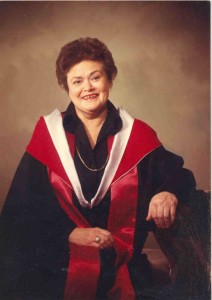 12 January 2020
12 January 2020
One of South Australia’s great nursing visionaries, Pamela J Spry AM, sadly passed away on Friday, 8th January, 2021, aged 96.
As Director of Nursing at the RAH from 1973 to 1984, Miss Spry was instrumental in bringing about many significant changes for the profession. “I unwittingly took the nursing staff in what I later came to realise was also a feminist direction,’’ she once recalled.
“Adelaide at this time was a very conservative place. I wanted to take the RAH in a more progressive direction,’’ she had said of her early years in charge. “I wanted nurses to no longer be seen by anyone as ‘handmaidens’ to the doctors but to begin to become their equal.’’
Her very first action as DON was to staff the Intensive Care Unit (ICU) with predominantly Registered Nurses “to stop the line of overwhelmed weeping Student Nurses, and to improve care for patients”.
“My second action as DON was to get rid of the ‘Shovel Hats’ worn by female Registered Nurses. I have a very clear memory of (another celebrated nursing pioneer) Aileen Monck in her office, removing her hat and throwing it into the corner with glee. We all shared her joy at this liberating act.
“Hats were a sign of occupational servitude and especially so for women, e.g., maids. On reflection this was my first leadership foray as DON into the feminist movement for the then (and still) overwhelmingly female dominated occupation of nursing.’’
Miss Spry later also got rid of the compulsory black stockings for female Student Nurses and white stockings for female Registered Nurses, allowing them to choose to wear nude/tan stockings instead.
Another of her very first actions as DON was to throw away the Nursing Home Register into which nurses had to sign out and sign back in by time left and time returned.
“I asked the Nursing Home receptionist for the Register which she duly gave me. I then threw it straight into the bin, to her absolute horror, and then calmly walked away,’’ Miss Spry said. “In my view nurses were now to be treated as trusted adults”.
However, it would be Miss Spry’s role in advancing nursing through education that would have the greatest impact on the profession.
“I strongly believe that the path to liberation for women is education,’’ she said. “I understood that education would allow nurses to take on more responsibility.’’
In 1976 Miss Spry undertook a Travelling Fellowship to the United States and the United Kingdom to look at both hospital and tertiary nurse-training settings.
She introduced the very first scholarships for RAH Registered Nurses to undertake the ‘bridging course’ in the college system to transition from a Certificate to a Diploma qualification. This was at the then Sturt College of Advanced Education that is now the Flinders University of South Australia.
“I did this because I understood very clearly that any change to nursing had to come from within and could not be imposed,’’ Miss Spry said.
“Those nurses who applied for the scholarship already supported the transition of nursing into the college system. They would and did return with a different perspective. These nurses were then able to effect change from within, especially with their resistant nursing colleagues, making the ground even more fertile for change.’’
Miss Spry said there was also considerable resistance from doctors, but “as time progressed it was somewhat ironic to see many of these same doctors encourage their daughters to undertake nursing in the college system’’.
To help to further empower her nursing staff, Miss Spry brought an experienced ‘nursing change agent’ over from the US to host education sessions for staff.
“This was not only about college education, but I also wanted to encourage and teach nurses to think for themselves more about nursing practice and not to rely so much on doctors/medical practitioners (who were overwhelmingly male).
“I wanted nurses to shrug off the patriarchal model and to embrace their own nursing model of care, separate from but collaborative with a medical model. Nurses had their own distinct knowledge and skills for which they needed and deserved more recognition.”
ANMF (SA Branch) CEO/Secretary Adj. Associate Professor Elizabeth Dabars AM said Miss Spry’s passing was a very sad loss. “She leaves behind a huge legacy, one which has greatly empowered the nursing profession,’’ Ms Dabars said.
“It is to be hoped her formidable, pioneering achievements serve as an inspiration for other nurses and midwives to fight for and advance the cause of their professions.
“Pamela Spry was a visionary giant within the nursing community and she will long be remembered as a powerful role model for many generations to come.’’
The ANMF (SA Branch) sends its heartfelt condolences to Miss Spry’s family and friends.